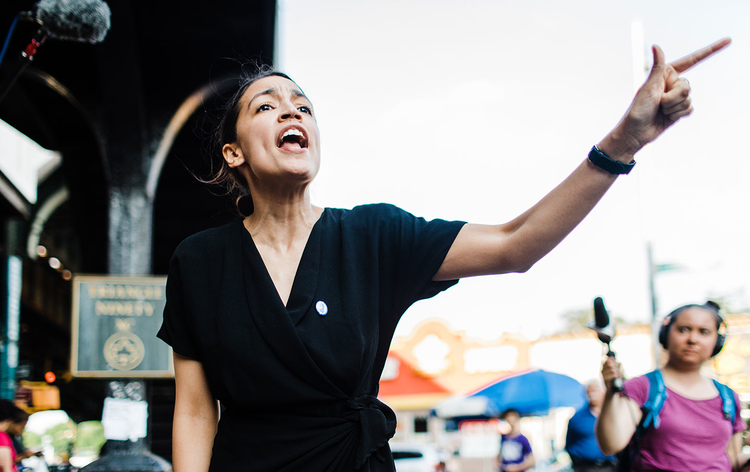Alexandria Ocasio-Cortez on her Catholic faith and the urgency of criminal justice reform
Christ came to me emblazoned on the upper arm of my beloved cousin Marc. The blue-black ink danced between the bullet scars and stretch marks that graced my cousin’s upper body. Atop this crown-of-thorns depiction was a tattooed banner with the phrase “Only God Can Judge Me.”
I have never known Marc as a criminal. I have only known him as the largest and funniest member of my family. As a child, I saw this tattooed arm over and over again. It appeared at family cookouts turning a lechón (roasted pig) in its fifth hour, it held me steady on Marc’s broad lap, and it was revealed during the wintertime, when our pipes would hiss until the relentless heat would force us all to roll our sleeves as far up as they would go.
I remember reading his tattoo each time I saw it, trying to understand what it meant: Only God Can Judge Me. Innocence, in its mercy, partly excuses us from having to fully reckon with the spiritual gifts of forgiveness, grace and redemption at the heart of the Catechism: I believe in the forgiveness of sins.
Marc—like several men in my family—had been caught in the webbed threads of poverty, geography and lack of opportunity during the fever pitch of 1990s mass incarceration. Baggy-pant boys like him fit the descriptions of “super-predators” and “thugs” that dominated our national discourse at the time. Marc served his time, and has been out of the system ever since—a miraculous feat, given that over 75 percent of released state prisoners in the United States are rearrested within five years. Today he is a union worker and a happily married father of three successful children.
Innocence, in its mercy, partly excuses us from having to fully reckon with the spiritual gifts of forgiveness, grace and redemption at the heart of the Catechism: I believe in the forgiveness of sins.
The still imprisoned are not so lucky. By virtually every measure, the United States incarcerates more of its people than any other nation in the world. When we look at the fuller picture of who we imprison, for how long and why, it may not be a stretch to conclude that our criminal justice system could very well benefit from a rite of penance of its own. There is overwhelming evidence that mass incarceration evolved as an outgrowth of Jim Crow laws, which itself was a system rooted in the subjugation of former slaves. According to legal scholar Michelle Alexander, there are more African-Americans under correctional control today than were enslaved in 1850—that is, before the Civil War.
When it comes to Latinos, the numbers are more confusing. While 40 states track race in their arrest records, only 15 states in the nation track ethnicity. This means that most states have little to no data on Latinos in the criminal justice system. We must also look at what imprisonment entails. Criminal justice reform must take into consideration factors including increasingly punitive Immigration and Customs Enforcement operations and the black-box detainment of immigrants and separated families; the ethics of solitary confinement; parole and probation; protecting due process; and the effects of incarceration on motherhood and mental health.
What should be the ultimate goal of sentencing and incarceration? Is it punishment? Rehabilitation? Forgiveness? For Catholics, these questions tie directly to the heart of our faith.
Discussions of reforming our criminal justice system demand us to ask philosophical and moral questions. What should be the ultimate goal of sentencing and incarceration? Is it punishment? Rehabilitation? Forgiveness? For Catholics, these questions tie directly to the heart of our faith.
Solutions are already beginning to take shape, which include unraveling the War on Drugs, reconsidering mandatory minimum sentencing and embracing a growing private prison abolition movement that urges us to reconsider the levels at which the United States pursues mass incarceration. No matter where these proposals take us, we should pursue such conversations with an openness to change and an aim to rehabilitate our brothers and sisters wherever possible and wherever necessary. By nature, a society that forgives and rehabilitates its people is a society that forgives and transforms itself. That takes a radical kind of love, a secret of which is given in the Lord’s Prayer: Forgive us our trespasses, as we forgive those who trespass against us.
And let us not forget the guiding principle of “the least among us” found in Matthew: that we are compelled to care for the hungry, thirsty, homeless, naked, sick and, yes—the imprisoned.
Alexandria Ocasio-Cortez is the Democratic nominee in New York's 14th congressional district. Her opponent in November will be Republican Anthony Pappas.






Religiousness has often been an outlet for people to get rid of aggression and unnecessary stress. But it stopped working long ago. People take anti-depressants when they want peace of mind. I myself prefer to use herbal medicines - https://naturalwellnesscbdoil.com/blog/cbd-in-texas/ It is ideal for self-treatment of nervous disorders and stress. I recommend that you try this method before moving on to antidepressants.
ReplyDelete